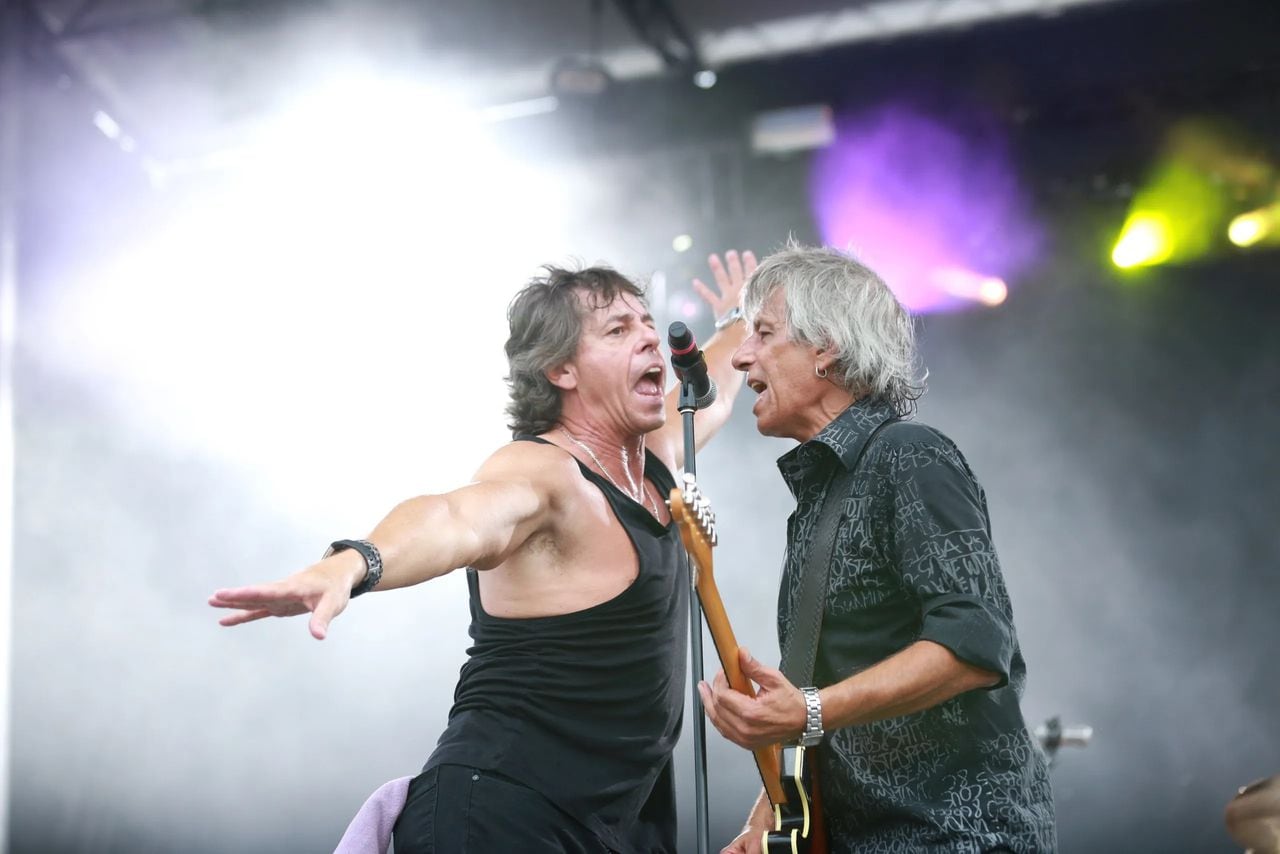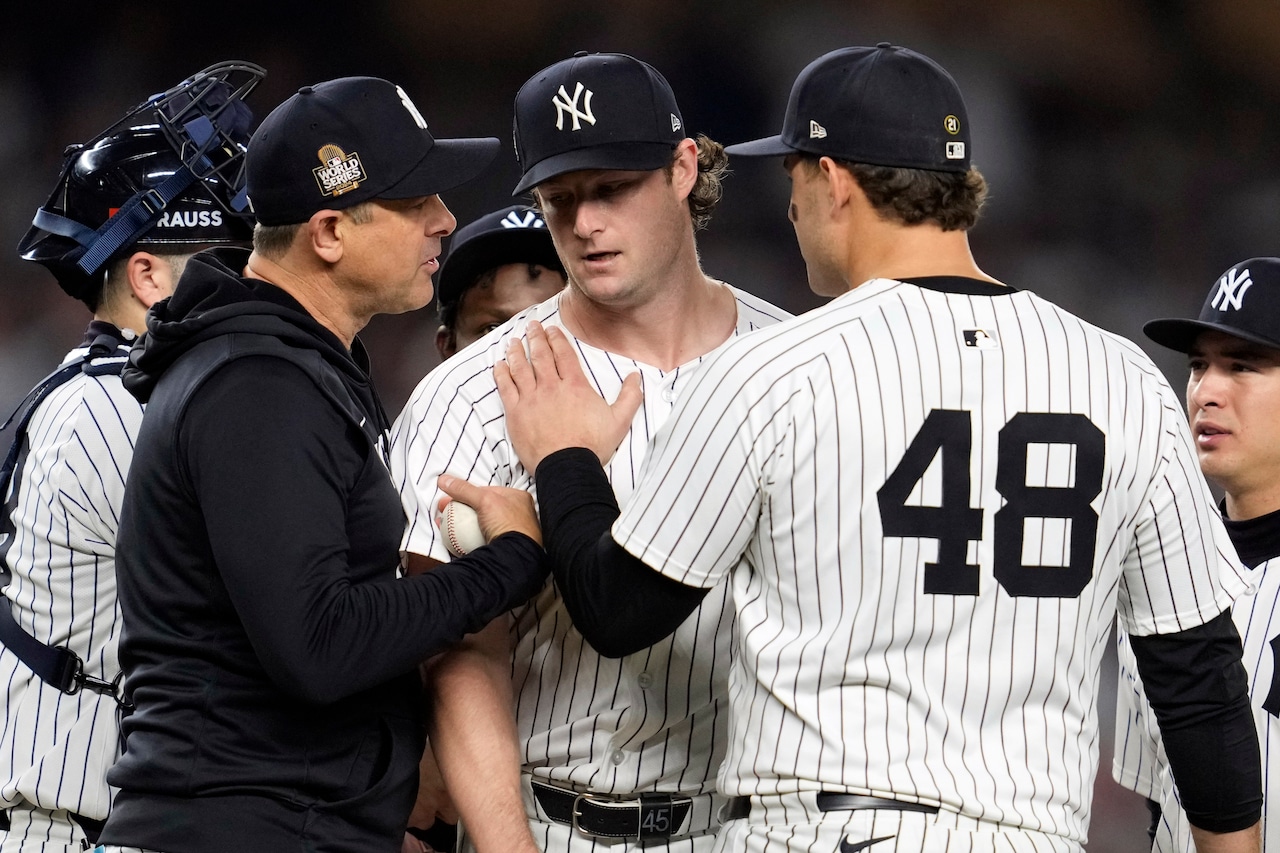
The Blushing Brides – who bill themselves as the “World’s Most Dangerous Tribute to the Music of the Rolling Stones” – have been performing for more than four decades at venues across the world, and on Friday, they will make a stop at MGM Springfield’s Aria Ballroom to open the casino’s Free Music Friday winter concert series.
“It will be exciting. It will be funny. It will be electric,” said Maurice Raymond, who has served as the band’s frontman since its inception. “You won’t leave going ‘oh, that was boring.’ I promise you.”
The band has been upholding and celebrating the legacy of The Rolling Stones since 1979 – and if that’s enough to have you saying “wow,” “that’s the response that most people give,” Raymond said. “It’s a long time, I know.”
Raymond sat down with The Republican before Friday’s concert to answer questions about the band, its music, and staying original in a world of tribute bands. The following interview has been edited for space and clarity.
Q. Could you share a bit about the band’s history and how The Blushing Brides came to be?
A. There’s a long story – kind of a tale of how The Blushing Brides became “The Blushing Brides, A Tribute to The Rolling Stones.” I was from Montreal myself, and James Green – the guitar player at the time in my band – and Paul Martin, Martin Van Dijk, and Richard Berthiaume were from Kingston, Ontario. If you’re in Springfield, I’d say it would be maybe Worcester or Boston, about that far. They had been in Montreal playing with their band, and they heard about my band (in 1978). They came to see my band and after the show was over, the guitar player (Paul Martin) walked up to me and asked me if I wanted to make a band, which we did.
James and I moved to Kingston in 1979. We got together and formed a band. Basically, the game plan was to do as the (Rolling) Stones had done to get a record deal. So what did the Stones do to get a record deal? The Stones loved the blues, they loved Chuck Berry, they loved Howlin’ Wolf, so what they did was they started to mimic those guys, they played their songs. By playing their songs, they developed their own specific sound, because no five white guys from London could sound exactly like Howlin’ Wolf or Chuck Berry. When they tried to do it, it created an entirely new sound, which became the sound of The Rolling Stones. We thought, “what a great idea, let’s do the same thing! Only we’ll do it playing Chuck Berry, blues, and include Rolling Stones music in there.”
We just wanted to get noticed for a record deal and we had always been writing our own songs, so we were writing a bunch of songs, and we were playing those and playing the Stones stuff. We were playing all through Canada, up and down Ontario and Quebec, and then we got a gig in Syracuse, New York. We opened the show with “Brown Sugar” and there was a reporter in the crowd, and the reporter wrote an article that said “Rolling Stones clones steal the show.” Everybody went, “what? Rolling Stones clones, what’s that?” So this whole thing then continued and we ended up playing in Boston and there was a big article in the Boston Globe about the Stones clones invading New England. This has been going on since 1980, but all the while, we were trying to get our own record deal, which we did get in 1981 from RCA. We signed a worldwide five-album deal and so we thought “wow, great! Our plan came to fruition.” Except our heads became so swollen with our own success that we started to fight amongst ourselves in musical direction.
Q. What happened after that, were you still able to put out an album?
A. We put out the first record – which was called “Unveiled” – on RCA, 1982 release. It did okay, but usually the second album is when bands sort of make it or break it. We never got a chance to make a second record because we broke up. We fought, we broke up, and we lost the record deal. So, in 1982-1983, we’re broken up, we’re playing with different bands, and Paul and I get together and we decide, “this is nuts,” we’ve never had the success and the musical acuity that we had when we were together. We decided to put the Brides back together, but we couldn’t get a record deal because apparently we had, in the words of some A&R people, “s— all over RCA.”
What we decided to do – because we had to eat and we were musicians – so short of joining polka bands or doing Top 40 or playing all different bands’ music – we thought, “everybody loves us doing the Stones, we’ll just do the Stones.” We started playing the Stones and instead of calling it The Rolling Stones clone band, we called it – we actually coined the phrase “A Tribute to the Music of The Rolling Stones.” This was in 1984, and we had lots of success – we were on the road playing 200, 225 shows a year across the United Stated and Canada. Things were going great. But by the time 1985 came, there was apparently a tribute band for everybody and your uncle. Everybody decided, “hmm, we’re going to do that too,” and it actually created this whole industry. This whole industry has now spawned from it. Now, before us, there was Beatlemania, a couple other bands like Crystal Ship and a Led Zeppelin band in Canada called The White, but nobody ever specifically called it something. Beatlemania was Beatlemania, it was a Broadway show, but there was no band playing on the circuits doing specifically that (tribute shows).
Q. How did The Blushing Brides continue to stand out with so many tribute bands popping up?
A. Luckily for us, I bore a resemblance to Mick Jagger, and my guitar player at the time (Paul Martin) bore a resemblance to Keith Richards. The rest of the band didn’t look anything like The Rolling Stones, they just looked like rock musicians, but because Paul and I looked like Mick and Keith, the public made that magical leap to “oh, they’re just like The Stones.” No we’re not.
The Blushing Brides legacy is that we play the music of The Rolling Stones, but we play it our own way. We never play the same song twice in a row the same way, we’ll always do it a little bit differently. It’s about interpretation as opposed to what the tribute band scene has turned into: this dress-up, everybody looks exactly like somebody from the band. It’s hilarious. If I’m going to see a band that’s apparently playing the music of The Rolling Stones, I don’t want to see a bunch of guys pretending to be Mick Jagger and Keith Richards. It’s almost insulting to my intelligence to think – “so wait a minute, you’re going to stand up there and talk with an English accent and prance around?” Look, I prance around on stage, but I prance around based on what I grew up learning, and it wasn’t just Mick Jagger. It was Peter Wolf from the J. Geils Band. It was James Brown. It was Otis Redding. I created my own style. If you ask around about The Blushing Brides, people will say “yeah, The Blushing Brides – yeah, they’re like The Stones, but not The Stones.” That’s really what our difference is, is we take the music to a different level and the performance to a different level.
Q. Do you think tribute bands today have gotten away from the music, and leaned in more towards the act?
A. There’s two ways to look at it. If you want to go see a musical that plays the music note per note, or as close as possible to note per note, and people that prance around on stage and pretend to be those people, the majority of tribute bands are like that. And it’s not hard to sit in your bedroom or to get into a rehearsal studio and go over those records and just repeat that every night, every night, every night. To me, that’s soul sucking. Basically, you’re not a musician, you’re a mimic.
The Blushing Brides are the complete and utter opposite. What we do is we take a song like “Stray Cat Blues” or “Brown Sugar” or “Sympathy for The Devil” and there will be a completely different take put on it by each musician, but that creates an entirely new, powerful musical moment. Because the musicians in The Blushing Brides are such talented musicians, we have the luxury of being able to do that, because we’ve been touring musicians for so long. For us, that’s what we want to do.
I could never dress up like a twat and prance around and talk in an English accent and sleep at night, but that is not to say that there aren’t people that long for that and savor that and are completely convinced that they are doing something remarkable. But they’re not.
I’m going to quote something Mick Jagger said about The Blushing Brides in 1981 (in the Boston Globe). They asked Mick Jagger about The Blushing Brides and he said “well, I think it’s quite mad, but America has a large appetite for recycled garbage.” And I thought, “coming from Mick, that’s kind of a compliment almost,” because he had not seen us. He didn’t know what we were doing, but what he was saying – he was talking about the tribute bands today.
If you go see the tribute bands today, they’ve all got this whole shtick. Everybody’s got a wig on, everybody’s not real. It’s kind of not unlike what’s going on in the world, for the most part, everything’s very fake and very… We have a term for it in the band, it’s very “caca,” which means “s—.” If we something absurd, we go “caca! caca!” And I think that says it all. Everything is so overblown, so full of s—. that we feel for us to be able to keep our sanity, we have to be real musicians and play the music in our own way. But because we have been doing this for 40-plus years and done over 5,000 shows, we do have a fanbase that understands what we do and appreciates what we do. We were the only name in town before, we were the only band doing something like this, so obviously we had lots of success. But now there’s so many bands, and so many promoters, and so many Col. Toms out there trying to get some angle, and in the end it’s all “caca.”
Q. How would you define The Rolling Stones’ legacy and how do you continue to uphold that legacy after all this time?
A. It’s a very difficult question to answer in such a short span of time, but I think that The Rolling Stones legacy is, in a word, integrity. Because they always stay true to the music, they always stay true to the blues, and they were always trendsetters. They always wanted to grow. They weren’t afraid to take chances, and that’s what I love about The Stones. They were always willing to grow, and they had integrity. And I think the thing about The Blushing Brides is that, yeah, we’re playing the music of The Rolling Stones, but we do it with integrity, we do it with love of the music, and we understand why they played that music. We love it for the same reason that they did, because it was honest and it has passion.
Q. What is your favorite song to perform?
A. I think that there’s so many and it comes and goes, but really the standard I have is “Midnight Rambler,” because “Midnight Rambler” has three different movements within it. It’s a nice piece of music – it’s usually about 10 to 12 minutes long, that song.
Q. So what can audiences expect from The Blushing Brides concert in Springfield?
A. You’re going to see a bunch of talented musicians playing great songs in our own way, but still true to the music, still true to the original compositions. There will be emotion. There will be musicianship. And there will be passion. And without that, without passion, music is nothing. That’s what we’re offering.
If you want to see real musicians playing real music, go see us. If you want to see some charade, some farce, some “caca,” go and see the other guys. They’ll look pretty – they’ll look all nice dressed up and they’ll have their costumes on – but in the end, you’ll go… you know, I can only equate it to when you have a romantic interlude with someone and you anticipate that it’s going to be really great, but then when you’re actually with the person, it kind of leaves something wanting. That’s how I look at other tribute bands.
For more information on The Blushing Brides’ free concert at MGM Springfield, and other upcoming concerts in the winter edition of Free Music Fridays, visit MGM Springfield’s website.






